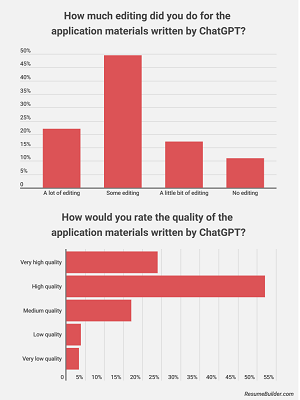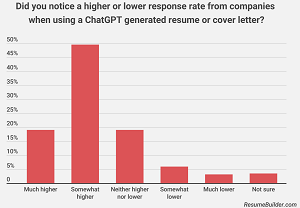News
Report: Job Seekers Highly Rate ChatGPT-Generated Cover Letters, Resumes
Careers firm Resume Builder said job seekers who have used ChatGPT to write resumes or cover letters rate its performance highly.
In fact, three in four candidates who used the red-hot, sentient-sounding AI-powered chatbot were granted interviews, according to a Feb. 13 report, based on a survey of more than 1,000 current and recent job seekers (defined here as having looked for a job within the past two months) who have used ChatGPT when applying.
"Despite launching not even three months ago, ChatGPT has already made major waves across many sectors, including recruitment and HR," the report said. "Although HR managers may be able to tell when a candidate uses AI to write their application materials, the time saving benefits for job seekers may be too good to pass up."
Key findings as presented by the company include:
- 46 percent of job seekers are using ChatGPT to write their resumes and/or cover letters
- 7 in 10 who have used ChatGPT report a higher response rate from companies
- 78 percent got an interview when using application materials written by ChatGPT
- 59 percent were hired after applying to a job using materials written by ChatGPT
- 11 percent were denied a job when the interviewer discovered they used ChatGPT
Interestingly, a recent article from Business Insider said that Microsoft's ChatGPT-powered "new Bing" search engine refused to write a cover letter, replying that it would be unethical and unfair to other applicants.
But when using ChatGPT directly, outside of Bing, it willingly complies, generating high-quality work that generally requires some editing.
 [Click on image for larger view.] Some Editing, High Quality (source: ResumeBuilder.com).
[Click on image for larger view.] Some Editing, High Quality (source: ResumeBuilder.com).
Also, most respondents believed they got a higher response rate from generated resumes or cover letters.
 [Click on image for larger view.] Higher Response Rate (source: ResumeBuilder.com).
[Click on image for larger view.] Higher Response Rate (source: ResumeBuilder.com).
Even though four in 10 respondents reported garnering interviews, the company indicated the chatbot's output probably included tells that it wasn't written by a human, something still seen in generative AI constructs, though it seem to be getting increasingly harder to determine.
The ResumeBuilder report cited an examination of that issue conducted by Welcome to the Jungle that found a recruiter can generally tell if a cover letter was written by an AI tool, describing the generated letters as "structurally sound but qualitatively questionable" (see the Jan 26 article, "ChatGPT: are AI-generated cover letters the way forward?").
Here's Resume Builder's Stacie Haller's take on that: "Job seekers who use ChatGPT for their cover letters and/or resumes are really no different than those going to a resume writing service or using readily available templates and online tools. Hiring managers know this when reviewing these documents and can likely tell if they were written by ChatGPT."
However, four in 10 respondents said interviewers have not been able to tell if ChatGPT was used, but some of those hiring managers who could make that determination found it to be a job-killing liability.
"Of the 40 percent who say an interviewer was aware they used ChatGPT to write their application materials, 35 percent (or 11 percent of the total sample) report that they have been denied a job because of this," the report said. "However, 58 percent of this group say they were not denied a job even though the interviewer was aware they used ChatGPT."
The recruiters' attitude toward accepting AI-created work seems to reflect the public's general consensus on generative AI, with many lauding amazing responses from the chatbot while others decry false information, plagiarism and several other problems (see the RedmondMag.com article, "'What Does It Actually Excel At?' A Conversation with an AI Expert About ChatGPT").
"We will see how this plays out, as it is still a changing environment," Haller said. "I don't see this changing the hiring process as much as it becoming a tool for job seekers to be able to produce more effective collateral in their search.
"The most important part of the hiring process is still the interviews, skills and personality testing, and references. It is not new that job seekers are not writing their own resumes, this is just using a new technology."
The commissioned survey was conducted online on Feb. 7, with all 1,000 participants having to pass through demographic filters to ensure they were currently employed for wages or out of work and looking for work.
About the Author
David Ramel is an editor and writer at Converge 360.